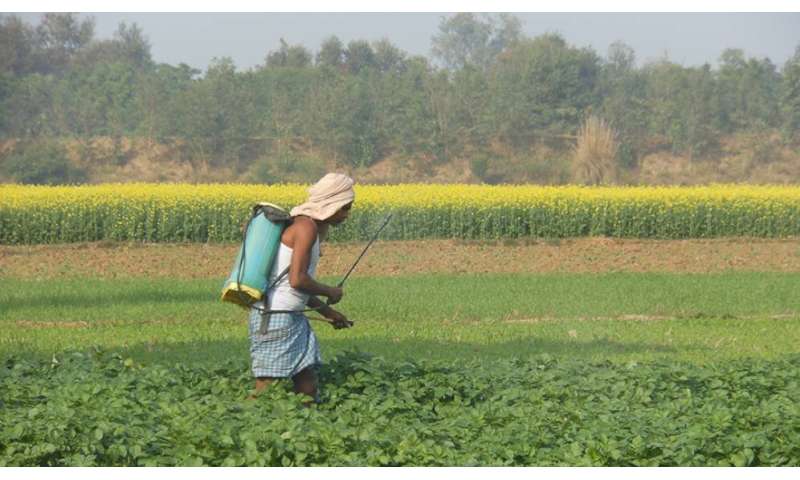India weeds out 27 highly toxic pesticides
by Ranjit Devraj
Decades of lobbying by rights activists and environmentalists to ban hazardous pesticides in India that are prohibited elsewhere in the world appear to be making progress following a 14 May government order proposing to eliminate 27 of the worst culprits from a list of 318 toxic farm chemicals registered for use in India.
"Given that pesticide poisonings, accidental or deliberate, account for an average of 20,000 annual deaths in this country, the government notification of a plan to phase out 27 extremely or highly hazardous farm chemicals should be welcomed by all," says Devinder Sharma, one of India's leading farming and food security experts.
Sharma is also concerned that pesticide and chemical run-offs contaminating soil and water have turned Punjab state, where he is based, into a cancer hotspot. "It is time authorities woke up to the fact that food crops, especially fruits and vegetables contain dangerously high levels of toxic chemicals detrimental to the health of farmers, consumers and to the environment," he tells SciDev.Net.
Government policy favouring a phasing out of hazardous farm chemicals was first apparent in 2018 when it announced the phased banning of 18 pesticides, amid opposition from the chemical industry. The planned prohibitions of an additional 27, if implemented, would reduce by almost half a list of 99 hazardous chemicals banned in other countries but continue to be used extensively, even indiscriminately, in India.
Currently, of the 318 pesticides registered in India, 18 fall in the extremely hazardous (Class IA) or highly hazardous (Class IB) categories of the World Health Organization's toxicity ratings. The proposed ban includes 10 from these categories.
The Indian government has been cautious about banning pesticides since it needs to balance public interests and environmental concerns against that of the rapidly growing pesticides industry and also of farmers who do need to control pests affordably.
When Kavita Kuruganti, national convenor of ASHA (Alliance for Sustainable and Holistic Agriculture), a volunteer-driven network, filed public interest litigation in India's apex court in 2017 seeking a ban on hazardous pesticides, the government's stand was that the deaths and injuries were the result of misuse and that chemicals in the hazardous list were being used in the US and other advanced countries.
It was then pointed out by ASHA that in the US, because of high levels of mechanisation, only about two per cent of the population comes into direct contact with pesticides. In contrast, farming in India is carried out by a large number of marginal farmers involved in all aspects of cultivation, including pesticide spraying on their small holding. Few can afford even basic personal protective equipment.
Of the chemicals on the new list due to be banned in India is monocrotophos, which is so toxic that the US' Environmental Protection Agency requires workers handling it to be protected by respirators. Monocrotophos happens to be the pesticide most responsible for fatalities in India and should, by rights, have been banned a long time ago, say volunteer agencies.
"We do have worries that the powerful chemical industry will find ways to delay an actual ban of at least some of the 27 pesticides on the list," Narasimha Reddy, advisor to the non-profit Pesticide Action Network (PAN) India, tells SciDev.Net. "They may even hide behind the economic slump caused by India's COVID-19 lockdowns that have lasted for more than two months."
Already the Investment Information and Credit Rating Agency (ICRA), which advises commerce and industry, has released a note warning that farmers would be exposed to pest attacks on their crops as the 27 pesticides proposed to be banned represent a major part of the armoury against a whole range of pests that plague both food and cash crops.
ICRA, in a note, also warns that "in a scenario where several pesticides were coming off patent, and Indian players were expected to invest in manufacturing these products, the loss of revenue on account of the ban could seriously hamper the ability of the domestic industry to offer new products in the Indian market".
For now, the Ministry of Agriculture and Farmers Welfare, which issued the 14 May order proposing the ban, has given industries, involved in manufacturing pesticides, insecticides and fungicides, 45 days to file their objections. "We want the 27 chemicals identified by the government as hazardous to be banned forthwith—thousands of lives are at stake," says Reddy.
Provided by SciDev.Net